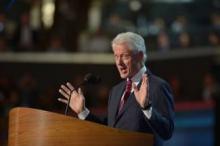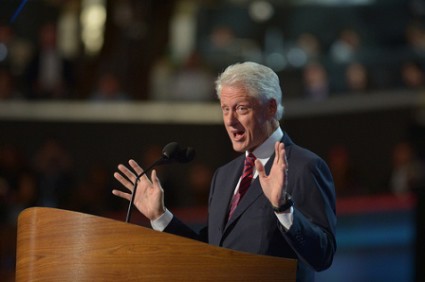User login
Leaving politics aside, I was struck by a recent announcement from the Heart Rhythm Society that the featured 2013 keynote speaker for the annual scientific sessions will be President Bill Clinton.
According to USA Today, the ex-President made $13.4 million in 2011 from speeches and an estimated $89 million since leaving office in January 2001.
How did he do that?
The article estimates that Clinton has made, on average, $189,000 per speech. Yes, per speech.
Whatever our political leanings may be, I think that we can all agree that $189,000 translates into a lot of RVUs for a 1-hour talk.
So, what does the HRS get out of the event? It’s not clear to me. President Clinton has an impressive delivery and is obviously quite popular. But if I were attending the meeting and paying dues, I might ask whether this is the best use of the Society’s funds. To be fair, the Society’s website states that "President Clinton’s keynote address is made possible in part through the support of VISIT Denver and the Denver Hotel & Hospitality Community," and we don’t know the precise amount of the honorarium. Still, I wonder about the specifics and the intent. Is there a meaningful policy angle that I am missing? Will the former President lobby for the HRS as a result of the speech? Is this intended as a trip down memory lane to a time when "Reinventing Government" was the mantra and regulations were a lot less onerous?
I’ve had the privilege of hearing in person several U.S. presidents and presidential candidates over the years. I’m sure HRS 2013 will leave a lasting impression on some members of the audience. And who knows? Maybe the President will discuss his experience as a cardiac patient.
But the whole affair seems to be "over the top" and even an unnecessary excess. A nice payday for the ex-President but a questionable choice for the cardiology community.
Dr. Paul J. Hauptman is Professor of Internal Medicine and Assistant Dean of Clinical-Translational Research at Saint Louis University and Director of Heart Failure at Saint Louis University Hospital. He currently serves as an Associate Editor for Circulation: Heart Failure and blogs while staring out his office window at the Arch.
Leaving politics aside, I was struck by a recent announcement from the Heart Rhythm Society that the featured 2013 keynote speaker for the annual scientific sessions will be President Bill Clinton.
According to USA Today, the ex-President made $13.4 million in 2011 from speeches and an estimated $89 million since leaving office in January 2001.
How did he do that?
The article estimates that Clinton has made, on average, $189,000 per speech. Yes, per speech.
Whatever our political leanings may be, I think that we can all agree that $189,000 translates into a lot of RVUs for a 1-hour talk.
So, what does the HRS get out of the event? It’s not clear to me. President Clinton has an impressive delivery and is obviously quite popular. But if I were attending the meeting and paying dues, I might ask whether this is the best use of the Society’s funds. To be fair, the Society’s website states that "President Clinton’s keynote address is made possible in part through the support of VISIT Denver and the Denver Hotel & Hospitality Community," and we don’t know the precise amount of the honorarium. Still, I wonder about the specifics and the intent. Is there a meaningful policy angle that I am missing? Will the former President lobby for the HRS as a result of the speech? Is this intended as a trip down memory lane to a time when "Reinventing Government" was the mantra and regulations were a lot less onerous?
I’ve had the privilege of hearing in person several U.S. presidents and presidential candidates over the years. I’m sure HRS 2013 will leave a lasting impression on some members of the audience. And who knows? Maybe the President will discuss his experience as a cardiac patient.
But the whole affair seems to be "over the top" and even an unnecessary excess. A nice payday for the ex-President but a questionable choice for the cardiology community.
Dr. Paul J. Hauptman is Professor of Internal Medicine and Assistant Dean of Clinical-Translational Research at Saint Louis University and Director of Heart Failure at Saint Louis University Hospital. He currently serves as an Associate Editor for Circulation: Heart Failure and blogs while staring out his office window at the Arch.
Leaving politics aside, I was struck by a recent announcement from the Heart Rhythm Society that the featured 2013 keynote speaker for the annual scientific sessions will be President Bill Clinton.
According to USA Today, the ex-President made $13.4 million in 2011 from speeches and an estimated $89 million since leaving office in January 2001.
How did he do that?
The article estimates that Clinton has made, on average, $189,000 per speech. Yes, per speech.
Whatever our political leanings may be, I think that we can all agree that $189,000 translates into a lot of RVUs for a 1-hour talk.
So, what does the HRS get out of the event? It’s not clear to me. President Clinton has an impressive delivery and is obviously quite popular. But if I were attending the meeting and paying dues, I might ask whether this is the best use of the Society’s funds. To be fair, the Society’s website states that "President Clinton’s keynote address is made possible in part through the support of VISIT Denver and the Denver Hotel & Hospitality Community," and we don’t know the precise amount of the honorarium. Still, I wonder about the specifics and the intent. Is there a meaningful policy angle that I am missing? Will the former President lobby for the HRS as a result of the speech? Is this intended as a trip down memory lane to a time when "Reinventing Government" was the mantra and regulations were a lot less onerous?
I’ve had the privilege of hearing in person several U.S. presidents and presidential candidates over the years. I’m sure HRS 2013 will leave a lasting impression on some members of the audience. And who knows? Maybe the President will discuss his experience as a cardiac patient.
But the whole affair seems to be "over the top" and even an unnecessary excess. A nice payday for the ex-President but a questionable choice for the cardiology community.
Dr. Paul J. Hauptman is Professor of Internal Medicine and Assistant Dean of Clinical-Translational Research at Saint Louis University and Director of Heart Failure at Saint Louis University Hospital. He currently serves as an Associate Editor for Circulation: Heart Failure and blogs while staring out his office window at the Arch.

